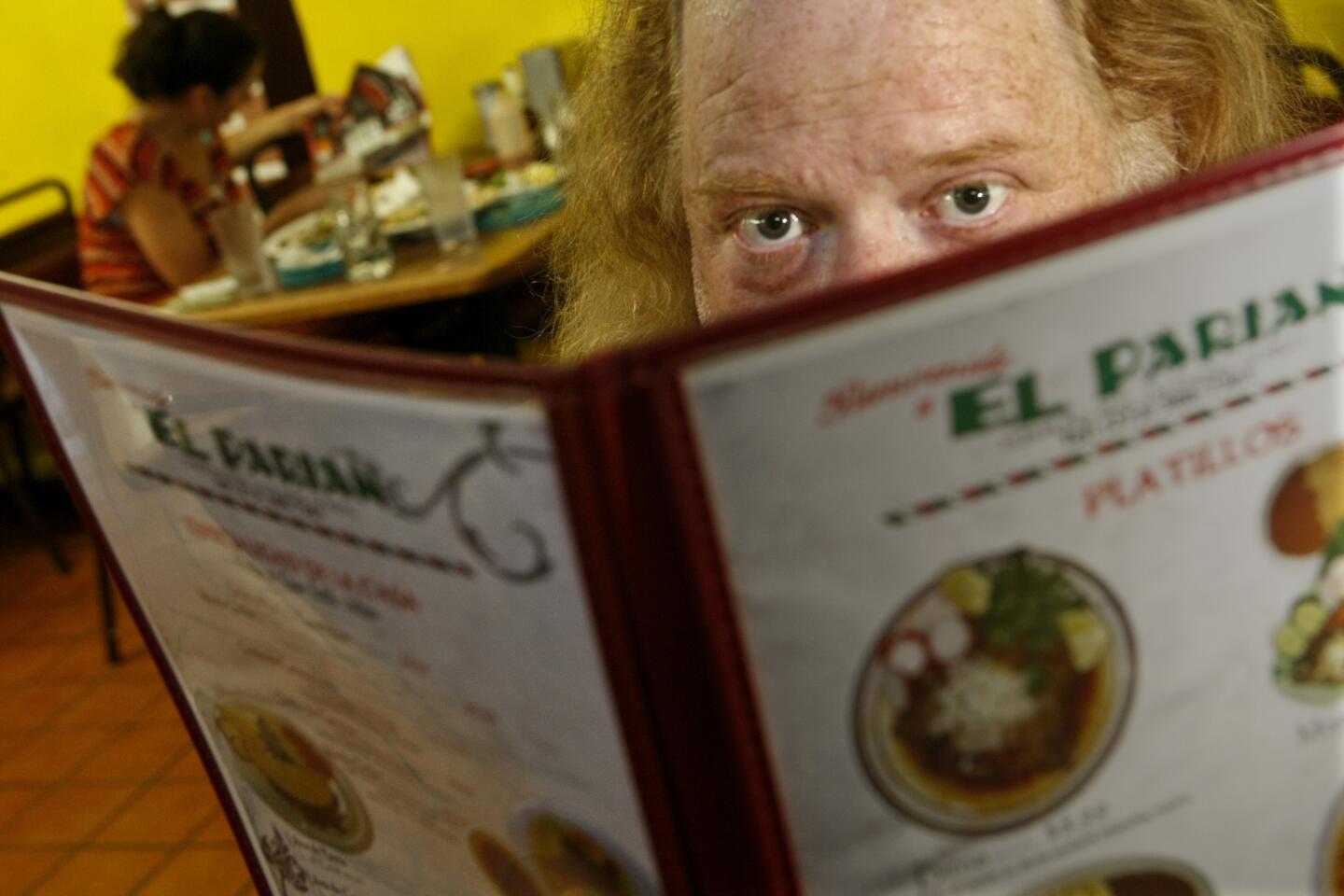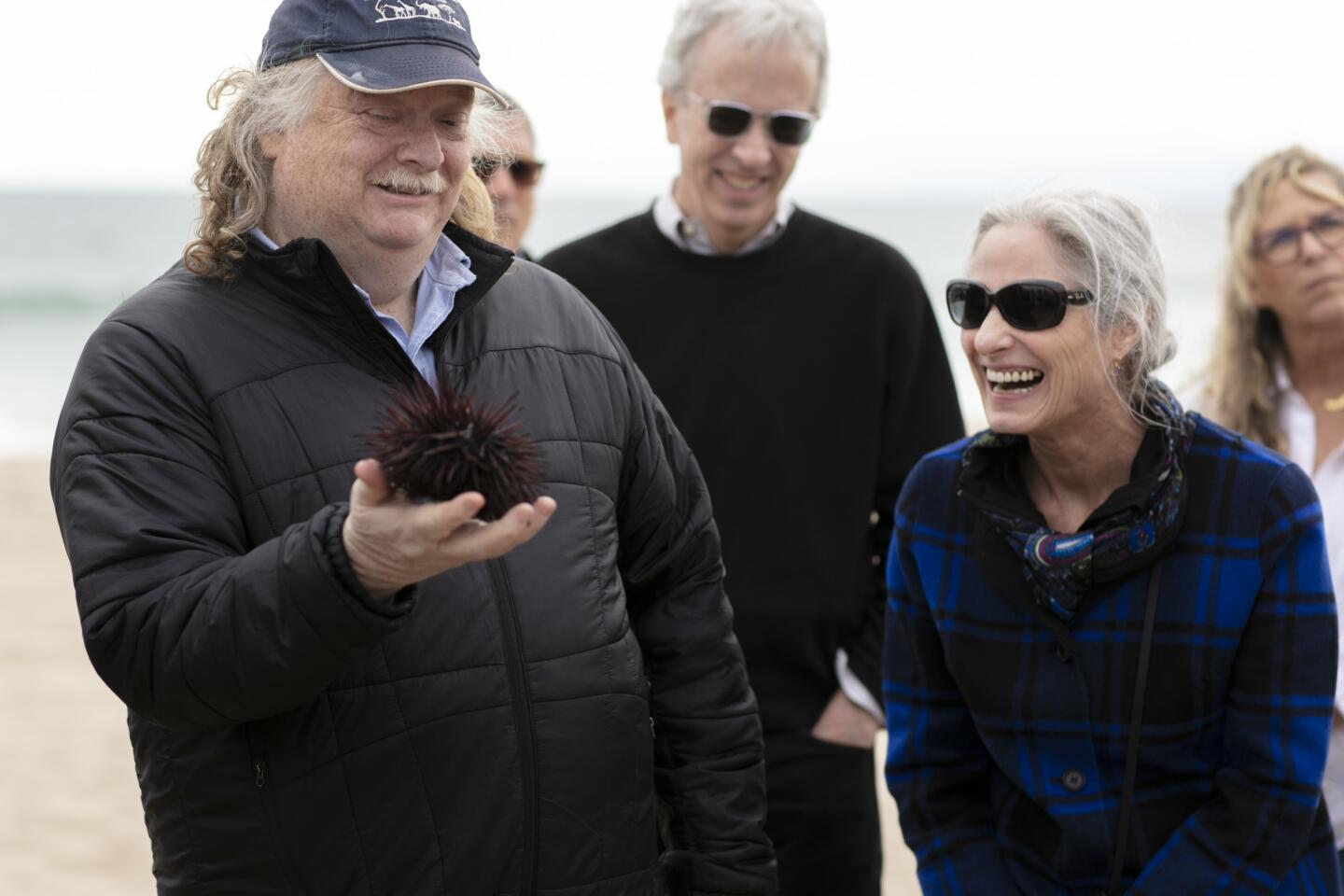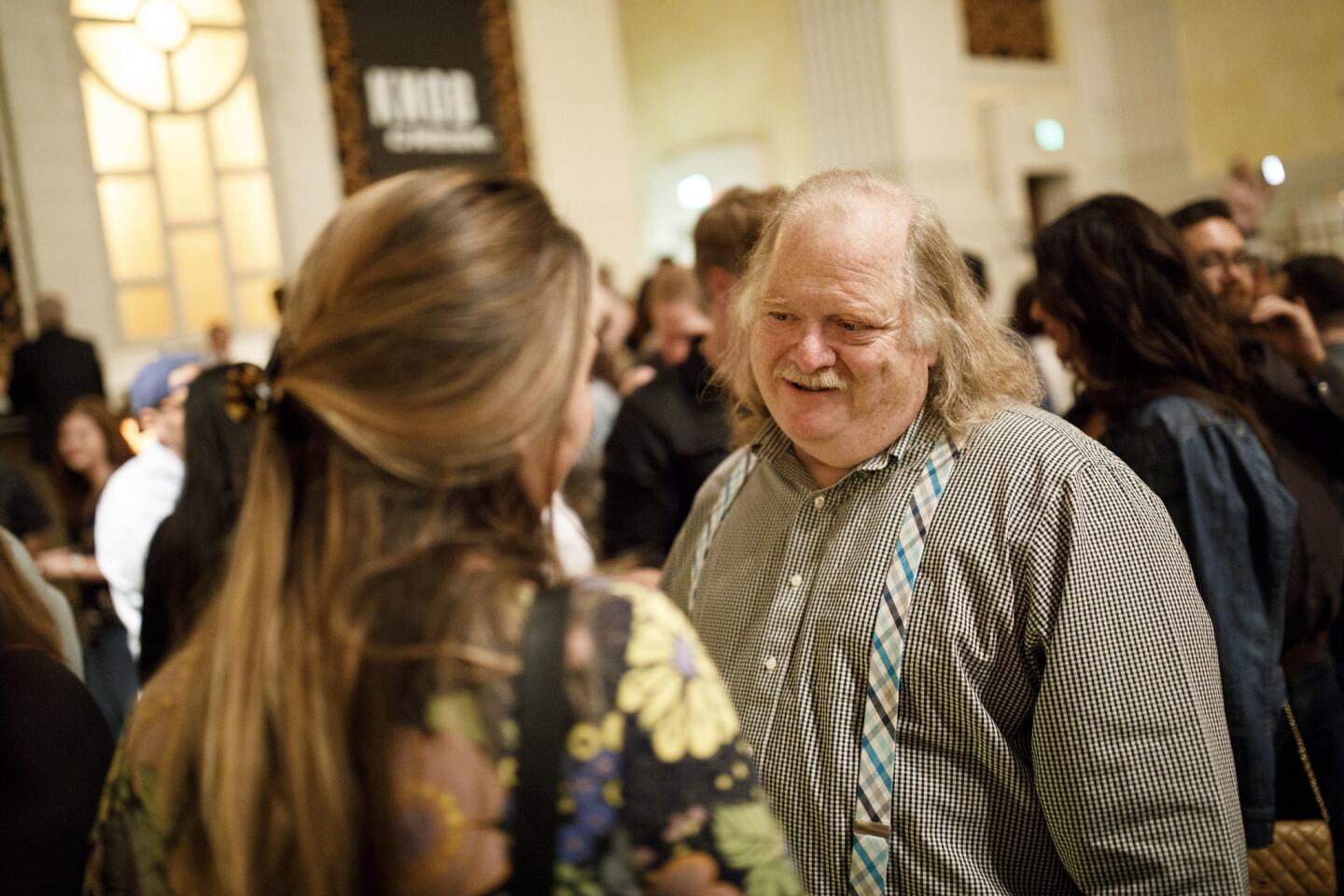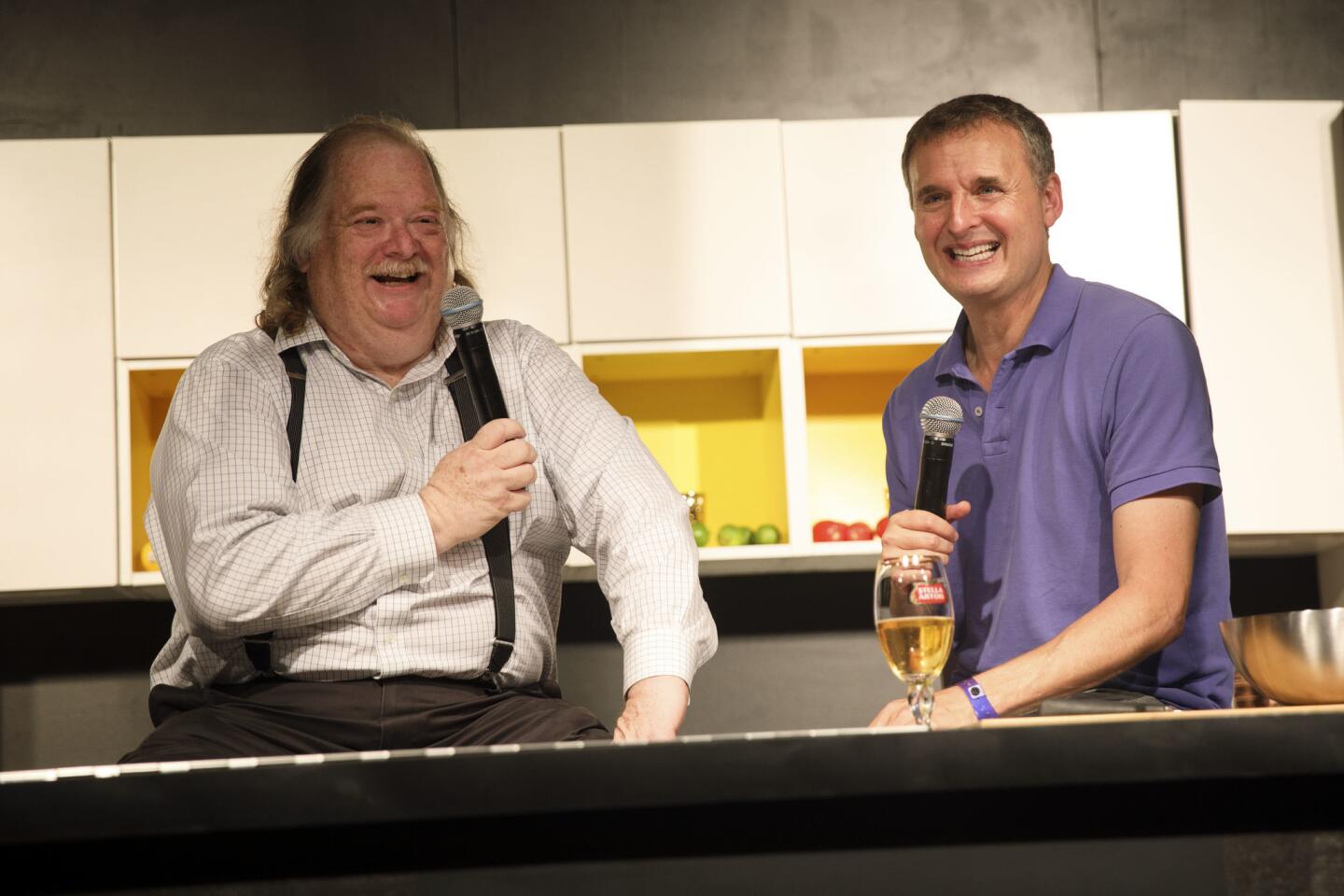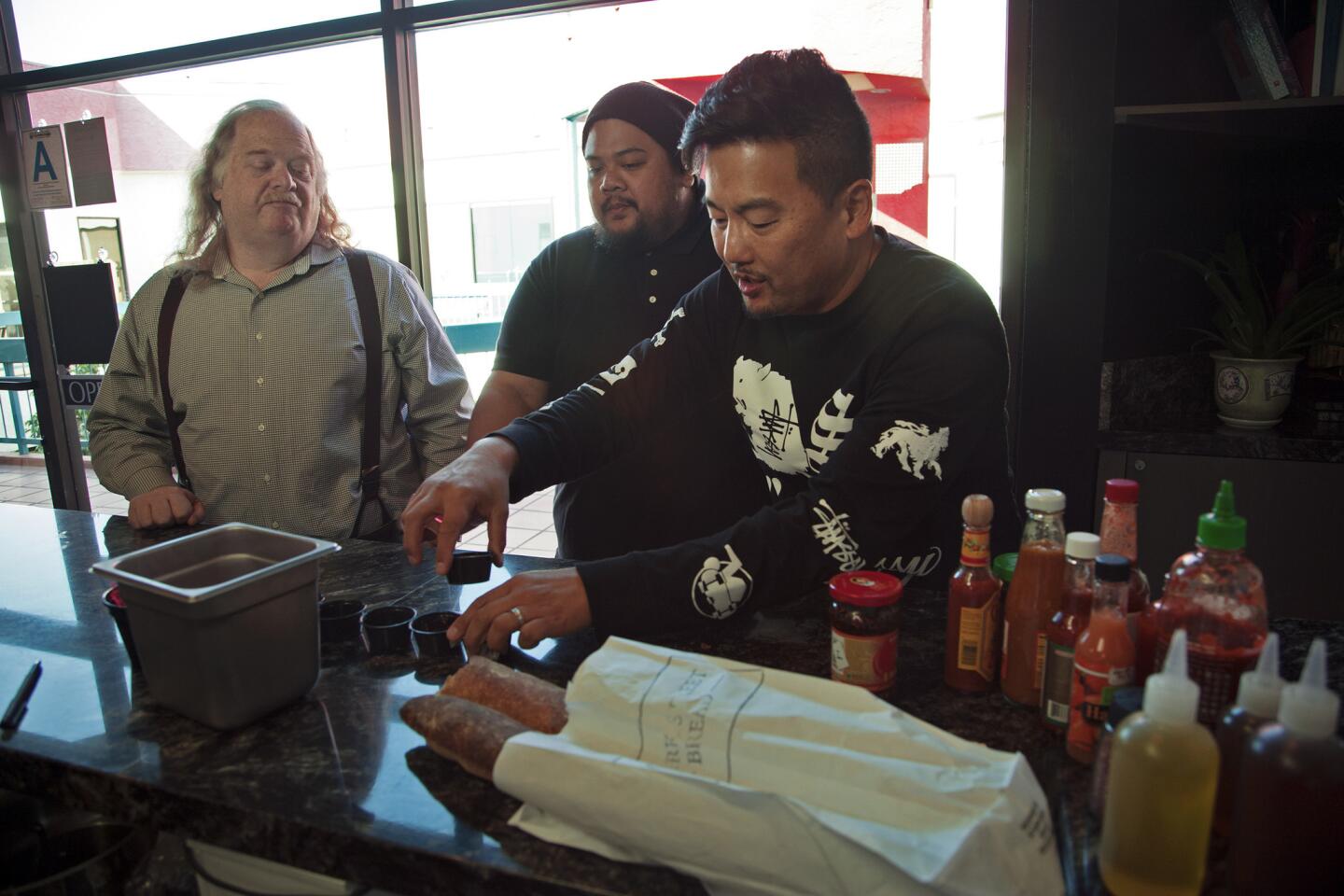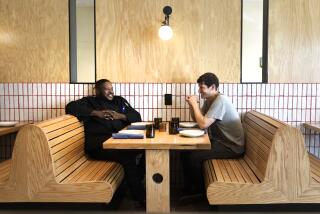Los Angeles Times restaurant critic Jonathan Gold dies at 57
Jonathan Gold, the Pulitzer Prize-winning Los Angeles Times restaurant critic who richly chronicled the city’s vast culinary landscape and made its food understandable and approachable to legions of fans, has died. He was 57.
Gold died of pancreatic cancer at St. Vincent Medical Center on Saturday evening, according to his wife, Times arts and entertainment editor Laurie Ochoa. The disease was diagnosed in early July.
One of the most widely admired voices of Los Angeles, Gold wrote about restaurants for four decades and became indelibly linked with the city in which he was born and raised.
Notable Los Angeles Times restaurant reviews by Jonathan Gold »
“He, more than any chef, changed the dining scene in Los Angeles,” said longtime friend, chef and Mozza co-owner Nancy Silverton. “He really was the ambassador for our city.”
Food criticism before him — and even during his time — focused on the austere, the high-end, the Michelin stars. Gold redefined the genre, drawn more to hole-in-the-wall joints, street food, mom-and-pop shops and ethnic restaurants than he was to haute cuisine. Although he appreciated and wrote beautifully about fine dining, he revered the taco truck more than the tasting menu.
“While most people might not go to places I write about, they know all the kinds of food that are available,” he said in a 2012 interview. “They get that this one place has really good soup dumplings, one has Shandong-style beef rolls and another has fantastic beef noodle soup. Even if most people don’t go eat it, I think there is a greater awareness.”
Gold’s death is the latest devastating loss for the food community, which is still reeling from the suicide last month of Anthony Bourdain, another acclaimed food writer. And it was a shock because Gold’s decline was so rapid that many of his friends and colleagues didn’t even know he was ill.
“I can’t imagine the city without him. It just feels wrong. I feel like we won’t have our guide, we won’t have the soul,” said filmmaker Laura Gabbert, who directed “City of Gold,” a 2015 documentary that followed the legendary critic as he ate his way through and reflected on Los Angeles. “It’s such a loss. I can’t wrap my head around it.”
Peter Meehan, a family friend and former editor of the now-defunct food magazine Lucky Peach, said he had shared more restaurant meals with Gold than anyone else outside his immediate family since meeting him six years ago.
“He’s not just a writer — he was a conduit for the stories of Los Angeles,” Meehan said. “I just see the city through his eyes and across the table from him. Thinking of him not being here is just hard. It’s just hard to process.”
Tell us how Jonathan Gold shaped your L.A. experience »
Gold pioneered a different approach to food criticism. His reviews — which appeared first in L.A. Weekly and later in The Times and Gourmet — were predominantly positive and focused on off-the-beaten-path ethnic restaurants, which he preferred to call traditional restaurants (he particularly disliked the phrase “exotic food”). He dismissed the notion of starred reviews and cheered the stuffy Michelin Guide’s departure from Los Angeles in 2010.
“Jonathan understood that food could be a power for bringing a community together, for understanding other people,” said Ruth Reichl, who edited Gold at The Times and at Gourmet. “In the early ’80s, no one else was there. He was a trailblazer and he really did change the way that we all write about food.”
Gold’s Counter Intelligence column, which he began writing in 1986, was an indispensable dining guide for Angelenos, giving them a way of discovering their own city.
“He ended up becoming like L.A.’s translator,” said longtime friend Evan Kleiman, host of KCRW’s “Good Food,” which Gold appeared on weekly.
“Do you know how many people have told me that when they moved here they had no idea how to deal with Los Angeles?” she said. “And they used him as a template to learn the city. It made them flip from being afraid and kind of not happy to be here to embracing it.”
With his suspenders, slightly rumpled button-down shirt, mustache and mop of feathery strawberry blond hair, Gold was an easy-to-spot silhouette around town, peering through the order window of his favorite food trucks and sending chefs into near-panic when he would show up at restaurants unannounced.
Affectionately known as J. Gold, he explored L.A.’s endless culinary offerings in his beat-up green Dodge Ram 1500, racking up 20,000 miles a year as he traversed the sprawling city in search of his next great meal. It was typically found in places “jammed into a strip mall, sharing a parking lot with a doughnut parlor, a kebab house and a check-cashing emporium,” as he described Culver City’s Mayura.
“I loved that when I went out with him — and I think this was true for a lot of people — he picked me up in his ridiculously oversized and always on-the-ropes truck and he dropped me off, even if it meant he was driving across Los Angeles four times in a night,” Meehan said. “The pre- and post-meal conversation in the truck was part of the Jonathan Gold experience, and it was not optional.”
Gold introduced readers to favorite dishes such as toothpick lamb, doro wot, soup dumplings and boat noodles, and single-handedly put many of L.A.’s signature restaurants on the map: Jitlada in Thai Town, Oaxacan institution Guelaguetza, Meals by Genet in Little Ethiopia, the taco truck Mariscos Jalisco. He sought out places that felt emblematic of the city, and the resulting reviews bore a distinctly Los Angeles feel.
“A Ducasse disciple quitting his job at an haute-cuisine pop-up to serve charred octopus tacos on a downtown street corner?” he wrote of Guerrilla Tacos. “You’re not going to find cooking like this anywhere else but L.A.”
Gold’s stamp of approval could be life-changing for restaurateurs.
After opening Jitlada in 2006, Jazz Singsanong said customers kept telling her that Gold would surely come to review her Thai restaurant.
“I didn’t even know what ‘food critic’ means,” she said. Nonetheless, “I prayed that one day Jonathan Gold would walk in.”
He did. Gold appeared in the Sunset Boulevard restaurant with friends soon after and fell in love with Jitlada’s “ferociously spicy southern Thai dishes.” He routinely named it one of his top restaurant picks in the city and Jitlada became a cult favorite.
To this day, Singsanong said, “all the customers that come in and I ask, ‘How did you find out about Jitlada?,’ they will say: Jonathan Gold.”
Gold was mission-driven as a critic, hoping his food adventures through the city’s many immigrant enclaves would help break down barriers among Angelenos wary of venturing outside their comfort zones. In the process, he made L.A.’s enormousness and diversity feel accessible and became one of the city’s most insightful cultural commentators.
“I am trying to democratize food and trying to get people to live in the entire city of Los Angeles,” he said in a 2015 interview with Vice. “I’m trying to get people to be less afraid of their neighbors.”
In 2007, when he was writing for L.A. Weekly, Gold became the first restaurant critic to win the Pulitzer Prize for criticism. The judges praised his “zestful, wide-ranging restaurant reviews, expressing the delight of an erudite eater.” He remains the only food critic to have won the prestigious award and was again a finalist in 2011.
The self-described “belly of Los Angeles” also won numerous James Beard Foundation journalism awards during his career, including the M.F.K. Fisher prize for distinguished writing in 2011 and, in May, the Craig Claiborne Distinguished Restaurant Review Award.
His reviews were compiled into a book, “Counter Intelligence: Where to Eat in the Real Los Angeles,” in 2000.
“You don’t have to be a food snob to love Jonathan’s reviews,” Kleiman said, “and you don’t even have to agree with him to love his reviews.”
Heralded for sensory prose that often read more like poetry than rote review, Gold penned evocative descriptions of food interwoven with a healthy sprinkling of pop culture references.
In one of his most memorable pieces, of East L.A.’s Moles La Tia, Gold wrote that the traditional black mole was “so dark that it seems to suck the light out of the airspace around it, spicy as a novella and bitter as tears, a mole whose aftertaste can go on for hours.”
In another review, of modernist Culver City restaurant Vespertine, Gold referenced “The Handmaid’s Tale,” Sun Ra, Frank Gehry, Jean-Antoine Watteau and James Turrell.
“He’ll drop in a heavy metal reference right next to a literature reference right next to talking about something your grandmother cooked two generations ago,” said his brother Mark Gold, associate vice chancellor for environment and sustainability at UCLA. “It makes people feel really comfortable.”
That ease was enhanced by Gold’s unusual and frequent use of the second-person point of view, which made readers feel like they were there, sitting across the table from him:
“If you have ordered it with cheese — you have to order it with cheese — a waiter scoops a big handful of white gratings over the top and bazookas it with a torch, creating several small fireballs along the way for effect until the mass breaks down into oozing, char-flecked rivulets that stretch from your chopsticks like pizza goo,” he wrote in his review of Koreatown galbi jjim specialist Sun Nong Dan.
A voracious reader as much as a voracious eater (as far as anyone could tell, his only aversions were to eggs and peanut butter, although he loved peanuts), Gold was famed for his extensive knowledge of whatever subject he was tackling. In addition to being able to vividly describe how a dish tasted, he was just as likely to rattle off its provenance, obscure ingredients and evolution. His boundless curiosity and meticulous research — illustrated in “City of Gold” as he thumbed through a book on Chengdu in preparation for a review on a Sichuan restaurant — afforded him a credibility unmatched by other critics.
A typical review might read, as it did in 2008: “Mayura specializes in the cooking of Kerala, the strip of southern India that touches the Arabian Sea, a cosmopolitan region, shaped by a thousand years of spice trading, whose food is influenced by Nayar Hindus, Muslims, Syrian Christians and even an ancient community of Jews.”
That deep context elicited respect, even awe, from chefs around the world.
“He knows every place. I don’t know how he does it,” David Chang, of L.A.’s Majordomo and New York’s Momofuku empire, marveled in “City of Gold.” “I don’t know any Korean that knows more about Korean food than Jonathan Gold.”
He preferred to praise chefs rather than pan them. If Gold wrote about you, he generally liked your food. Earnest and slightly awkward in person, he would voice displeasure with a gentle rebuke instead of gleeful excoriation.
“He wasn’t looking down his nose at the world, he was looking out from the table and trying to put restaurants, meals and cuisines in context. Empathy, understanding, commensality: That’s what he brought to the game,” Meehan said. “Jonathan didn’t write restaurant reviews, he wrote about who we are and how we feed each other. He wasn’t just a better writer than the rest of us, he cared more, too.”
Many chefs noted Gold’s fairness and praised his ability to recognize their vision — sometimes before they had even defined it.
“The weird thing about my first interaction with Jonathan is he helped me figure out what I was trying to do,” Roy Choi, of Kogi and Locol, said in “City of Gold.” “When he writes about me, he understands and is able to articulate the little kind of secret tangled webs I have inside that I’m trying to put out into the plate — he understands it. And I’ve never explained it to him.”
“Sometimes as a chef we don’t see what we create,” Ludo Lefebvre, chef of L.A.’s Trois Mec, Petit Trois and Trois Familia, said in the documentary. “But Jonathan opened my eyes.”
The eldest of three boys, all born at UCLA in the 1960s, Gold spent his childhood attending Dodgers games and eating at Junior’s and Canter’s delis. His father was a probation officer, his mother a longtime high school librarian at L.A.’s Dorsey High School. The Reform Jewish family uprooted several times but always stayed local, moving from a neighborhood near Inglewood to West L.A. and then to Beverly Hills, where Gold graduated from high school.
At UCLA, he studied art and music. After college, he had a number of jobs — information operator, music booker, proofreader at a downtown law journal — and then began working for L.A. Weekly, where he wrote about music, art, theater, movies and food. He also wrote for publications that included Spin, Rolling Stone and The Times.
A classically trained musician who grew up listening to classical at home, Gold formed the punk rock bands Overman and Tank Burial, playing the cello.
“Oh, my God, they were so bad,” Mark Gold recalled.
Although he would become famous for his food criticism, he was an equally gifted music writer and became L.A. Weekly’s music editor. Gold covered hip-hop, grunge and the rise of gangsta rap in the 1980s, spending days in the studio with Eazy-E and the rest of the iconic group N.W.A and earning the nickname “Nervous Cuz” from Dr. Dre and Snoop Dogg.
“One of the things I used to love to do is just take as much time as someone would give me,” he said in a Q&A with Lucky Peach in 2012. “I’d show up to the studio and everybody’s nervous about being interviewed, so I’d just kind of hang out all day. Then you just come back the next day and you’re in the studio like it’s no big deal. And eventually, they’re talking to you.”
Even early in his career, he demonstrated an innate gift for language: During a photo shoot one day in 1989, Eazy-E “reappears with a heavy-canvas duffel bag and empties weaponry onto the grass like a Little League coach pouring out bats and balls,” Gold wrote in L.A. Weekly.
“Nine-millimeter repeating pistols and 12-gauge shotguns and a couple of small-bore rifles and a .38 and a mean-looking sawed-off, clips, sights, scopes and boxes of ammunition, an arsenal bigger than Sergeant Samuel K. Doe needed to overthrow Liberia. But no AKs. Not at Mom’s house.”
Gold met Ochoa in 1984 while the two were working at L.A. Weekly — he as a proofreader, she as an intern. He wooed her with flowers and his mother’s peach pie — Judith Gold was a famously good cook — and the two were married in 1990 at the now-shuttered Campanile on La Brea Avenue.
Gold loved throwing a good party, hosting holiday get-togethers and dinners for their tight-knit circle of friends at their home in Pasadena. He was a skilled home cook, friends said, and specialties included gumbo, red beans and rice, carbonara, roasted meats and “anything where he was able to introduce pork,” Silverton said.
His only struggle: getting the food done on time (at work, Gold was also notorious for busting deadline).
“Jonathan would have you over for dinner at 7:30 and you would arrive at 7:30 because that was the polite thing to do, and at 7:30 the first pot of water was starting to boil,” Silverton said. “But it was worth it, because once you had it, it was a really delicious meal.”
Gold and Ochoa have two children, 23-year-old Isabel and 15-year-old Leon. A devoted father, he would cook dinner for the kids before heading out for the night to review a restaurant, take them to Comic-Con and bring friends to Leon’s flag football games.
Every summer, the family would travel to Italy with Silverton, who said it was not uncommon for Gold to pile Ochoa, Isabel and Leon into the car, drive three to four hours away for lunch, return, and then drive another two hours to try another place for dinner.
Gold’s first Times byline appeared in 1988, a review of the Sherman Oaks bistro Mistral (“You might, of course, start off with a crock of archetypically Parisian onion soup.”).
He left L.A. Weekly in 1999 when Ochoa was offered the executive editor position at Gourmet under Reichl. Gold followed, taking a position as New York restaurant critic at the magazine.
But he and Ochoa missed L.A., and they returned a few years later. She became editor in chief of L.A. Weekly, and he its restaurant critic.
Gold moved back to The Times six years ago; he wrote more than 1,550 print stories for the daily newspaper during his career.
In 2015, after years of hiding behind masks, wineglasses, menus and cereal boxes to protect his identity as a critic, Gold renounced his anonymity. With his distinctive visage, he knew restaurant owners, cooks and servers recognized him anyway and decided that “the kabuki of the pose is a distraction.”
“In a way, the game of peekaboo is harmful both to critics and to the restaurants they write about,” he wrote in a piece explaining his decision. “If chefs truly can cook better when they know a critic is in the house, then restaurants without an early warning system are at a permanent disadvantage. A critic who imagines himself invisible may find it easy to be cruel.”
Gold quickly became one of the most high-visibility journalists at The Times, headlining numerous annual events for the paper, including the Gold List, a one-night celebration of his top picks; the Taste, a three-day festival held over Labor Day weekend; and Food Bowl, a month-long citywide event that Gold created and spearheaded.
“Jonathan’s humanity came through in his writing and in his many public appearances,” said Dr. Patrick Soon-Shiong, The Times’ owner and executive chairman. “His death is heartbreaking — an incalculable loss to all who knew him and loved his work.”
Readers adored Gold. Wherever he went, he was swarmed by restaurant owners hoping to entice him to come try their food and by loyal fans seeking pictures. Though somewhat shy, Gold was always happy to oblige, posing dutifully for selfies but also taking the time to engage, asking questions about where they were from and what they liked to eat.
“He so greatly enjoyed being there for people, and making people happy,” Mark Gold said.
His annual 101 Best Restaurants guide, released every fall, served as an ambitious checklist for foodies, who would spend the next year meticulously working their way through his list of favorite restaurants. The Times developed a “Goldbot,” a Facebook chatbot that would churn out Gold-approved suggestions on where to dine. His live discussions on latimes.com, Lunchtime with Jonathan Gold, were a way for readers to pepper him with questions on food, restaurant etiquette and recommendations.
To a reader’s question of “where is your favorite khao soi in town?” during a lunchtime chat in November, Gold quickly responded:
“I miss the version at the late Pok Pok, but the khao soi at Night + Market Song is always good. I like the khao soi at Spicy BBQ, although it is authentically inauthentic, if you know what I mean. Renu Nakorn in Norwalk and Sri Siam in North Hollywood are good bets. And I used to love the version at Top Thai in Reseda.”
Gold was protective of Los Angeles and how it was portrayed. For years, when the Los Angeles food scene was overlooked by critics who preferred dining in New York and San Francisco, Gold was quick to defend and champion it.
After New York Times restaurant critic Pete Wells disparaged the Oakland location of Locol, a fast-food chain that originated in Watts, Gold penned an impassioned essay in response.
“Locol is less a replacement for a fast-food restaurant than a better version of it,” he wrote. “Someday, if he’ll allow me, I’d like to take Mr. Wells to Watts.”
Perhaps to make a point, when it came time to pick his first Restaurant of the Year recipient three months later, Gold chose Locol.
“An ideal candidate has delicious food — that’s a given — but also a sense of purpose, a place within its community and the ability to drive the conversation forward,” he said of how he made his decision. “It should feel like L.A.”
Like a proud father, Gold especially enjoyed taking out-of-towners around Los Angeles.
Four years ago, when Meehan was visiting from New York, he tasked Gold with showing him a new take on fried chicken.
Cruising along the freeway in the critic’s beloved truck, the two were ostensibly headed toward Lefebvre’s bistro Petit Trois when Gold took an abrupt detour.
“Mid-ride, he swerved across four lanes of traffic and took us to eat fried chicken neck tacos in East L.A.,” Meehan recalled. “We were sitting there, gnawing at bones, next to a family whose kids were doing their homework while eating those tacos, and he was beaming. He loved the entirety of the landscape of L.A.”
Gold spoke often about how fortunate he was to do what he did for a living.
“I love going out to eat in the way a theater critic loves theater. I love going to farmers markets. I love sticking my hands in pots,” he said in an interview this year. “And it turns out food is a pretty good prism through which to view humanity.”
Twitter: @byandreachang
UPDATES:
8:55 p.m.: This article was updated with additional reaction to Jonathan Gold’s death.
This article was originally published at 6 p.m.
More to Read
Start your day right
Sign up for Essential California for the L.A. Times biggest news, features and recommendations in your inbox six days a week.
You may occasionally receive promotional content from the Los Angeles Times.
